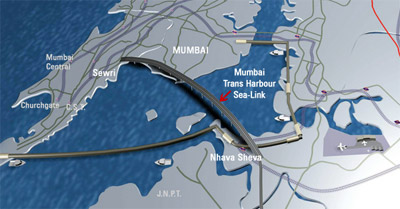Mumbai Trans Harbor Link caught in flamingo flap, denied eco clearance again
- 26th Jun 2015
- 2984
- 0

Believe it or not, the 22 km long Mumbai Trans Harbor Link project - the country’s largest proposed sea link - has been delayed yet again - this time by a flock of migrating flamingos which frequent the Sewri mud flats that also houses an estimated 150 bird species.
The ambitious project which is expected to provide the crucial connectivity between Mumbai and Navi Mumbai has been discussed and rejected clearance as many as four times since 2013 by the centre’s Forest Advisory Committee (FAC) as it affects the existing mangroves in the area and the visiting flamingo population.
The FAC has now directed the state government to share the proposed measures to save the mudflats and bird habitat with credible external organizations like the Dehradun-based Wildlife Institute of India or the Bombay Natural History Society (BNHS). The cost incurred for preparing this detailed report is to be borne by the MMRDA, the state’s nodal development agency.
Further the committee has also asked for more details on the development of a special Flamingo sanctuary, proposed by the state government as an alternative, which is likely to be spread across a 19-km plot due north of the proposed harbor link.
The proposed Trans Harbor Link project between Sewri and Chirle in Navi Mumbai is a key infra development project for the state government and is expected to considerably reduce the travel time between  South Mumbai and Navi Mumbai in addition providing a direct link to the Jawaharlal Nehru Port Trust for commercial vehicular traffic.
South Mumbai and Navi Mumbai in addition providing a direct link to the Jawaharlal Nehru Port Trust for commercial vehicular traffic.
However it’s the project’s Mumbai starting point - at Sewri - which houses approx 20,000-30,000 flamingos and a crucial mangrove habitat that has now become a serious bone of contention between the state government and the environment ministry at the Centre.
The INR 11,000 cr project needs the ministry’s clearance since it’s expected to impact approx 38 hectares of protected mangrove forests and roughly 8.9 hectares of forest land on the Navi Mumbai end.
Interestingly enough, the current imbroglio is expected to draw the much-needed attention to the deplorable condition of Sewri’s mudflats which are now the muted victims of massive pollution caused by a slew of coal depots, domestic sewage and shipyards, inspite of being listed as an ‘Important Bird Area’, courtesy the sanctuary they provide to an estimated 150 bird species.
Since its launch, the project has been mired in a range of controversies with leading environment groups and organizations opposing it at various forums expressing fears of irrevocable environment damage if it got the green signal.
An estimated 47.41 hectares of forest land, mostly mangroves will have to be diverted for building the six-lane MTHL road in the state’s Raigad and Thane districts.
The BNHS had even proposed an alternate alignment, approx 500-700 metres south from the present site but the proposal was rejected by MMRDA officials, citing reasons of cost overruns and the pre-existence of undersea pipelines and cables in the new location.
In its earlier review of the project the FAC had made a terse mention of the fact that neither the state's chief wildlife warden nor the MMRDA had made any mention of the proposed alternative alignment.
Struck by the observations, the state government had then proposed developing a flamingo sanctuary on the project’s north end, of which the FAC has now sought more details.
According to experts, the latest rejection by the FAC is a major setback for this crucial infra project that is already bearing the brunt of multiple delays. In the last decade alone, the project has gone through three unsuccessful tendering processes for PPP, forcing the MMRDA to pick up the gauntlet on a cash-contract basis.
For the moment, the Fadnavis government has already got about 20 percent of the funding required for the project from the centre, and is contemplating the source for the balance funds.


Comments
Add Your Comment
Thank you, for commenting !!
Your comment is under moderation...
Keep reading other articles